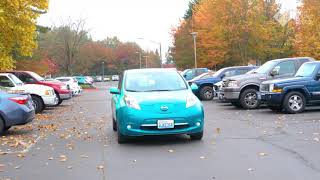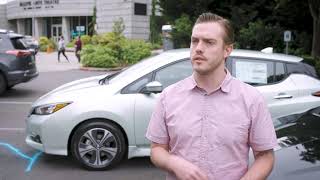Why drive electric?
It’s time to get excited for an electric transportation future! Here are three great reasons to think about going electric.
EVs are fun to drive
No one wants to drive a boring vehicle. Good thing there’s nothing boring about electric vehicles.
- Electric motors generate near-instant torque. This means EVs can have extremely fast acceleration and a zippy feel compared to gas-powered cars.
- EVs are quiet, eliminating engine noise almost entirely. And, their ergonomic design tends to reduce wind noise at higher speeds.
EVs can save you money
A Consumer Reports study found electric vehicles can be $6,000 to $10,000 cheaper over the life of the vehicle than comparable gas-powered cars despite the higher upfront cost. A big part of that is savings on fuel and maintenance.
- Electricity is much cheaper – and prices more stable – than gasoline, especially in Washington. With current prices, it’s entirely possible to save over $2,000 per year on fuel by switching to an EV, if not even more.
- EVs have fewer parts to maintain than gas-powered cars and don’t require transmission fluid, spark plugs or oil changes. Savings on maintenance can exceed $1,000 every five years.
EVs are better for the planet
Currently, transportation accounts for 45 percent of Washington’s emissions. Switching to electric vehicles will be vital to creating a cleaner future.
- Switching to an EV can reduce your annual CO2 emissions from driving by 65 percent to over 90 percent.
- EVs don’t produce tailpipe emissions, leading to cleaner air in our communities.
There’s an EV for everyone
Our interactive Electric Vehicle Guide can help you find the EV that fits your unique needs. Browse the latest models, compare with gas-powered vehicles, find available incentives and discover how much you can save by going electric.

PSE is investigating different electric car charging options for our customers. For more info, or general questions, please talk with one of our Energy Advisors.

ELECTRIC BICYCLES
You don’t need a car to go electric. Electric bicycles – or e-bikes – are a type of electric vehicle and can replace many car trips. They also produce less than 1 percent of the CO2 of an electric car, cost less than $50 to fuel per year, and are a lot of fun to ride.
-
EV range
Knowing you’ll have enough charge to get to your destination is a real concern when making the switch to an electric vehicle. However, it’s likely most every EV on the market will be able to handle your daily driving needs on a single charge. In 2023, the average range for a new EV under $50,000 was over 256 miles per charge. Plus, with the majority of EV charging done at home, you can have a full charge ready to go every morning. For longer trips, available charging solutions – including at workplaces and public spaces – are increasing.
-
EV batteries
Batteries are a hot topic when it comes to electric vehicles. A few things you’re likely wondering:
- Replacing an EV battery can be expensive. However, you’re unlikely to have to pay to replace it. Most EV batteries are under warranty for eight to 10 years and 100,000 to 150,000 miles.
- EV batteries are safe. There are strict standards for limiting chemical spillage from batteries and securing batteries during a crash.
- While electric vehicles are overall better for the environment than gas-powered cars, there is an environmental impact associated with battery production. Responsible sourcing of materials and beneficially reusing industrial wastes is perhaps currently the best solution available to the battery industry for reducing environmental footprint. There is hope that as battery technology progresses, these environmental impacts will be reduced.
- The reuse and recycling of electric vehicle batteries is a growing industry. Startup companies are partnering with automakers to recycle the materials that make up EV batteries, and the recently passed Inflation Reduction Act provides incentives for automakers using recycled materials in their batteries. Meanwhile, batteries that are no longer able to power an EV efficiently may still have around 80 percent of their original storage capacity. EV batteries are being reused for things like intermittent renewable energy generation and storage at EV charging sites.
-
Battery only vs. plug-in hybrid
Plug-in hybrid vehicles (PHEVs) can be more cost effective and better for the environment than gas-powered vehicles, however they don’t offer the full financial and environmental benefit as battery-only electric vehicles (BEVs). They’re also not as popular and have fewer models to choose from. As of August 2023, 78 percent of all EVs in Washington were BEVs, and 86 percent of all new EVs registered in Washington in 2022 were BEVs.
-
PSE and EVs
Through our Up & Go Electric programs, PSE is supporting our customers as they transition to an electric transportation future. One way we’re doing this is by making it easier for electric vehicle drivers to charge where they live, work and travel. Learn more about:
-
Additional links








PSE is investigating different electric car charging options for our customers. For more info, or general questions, please talk with one of our Energy Advisors.









